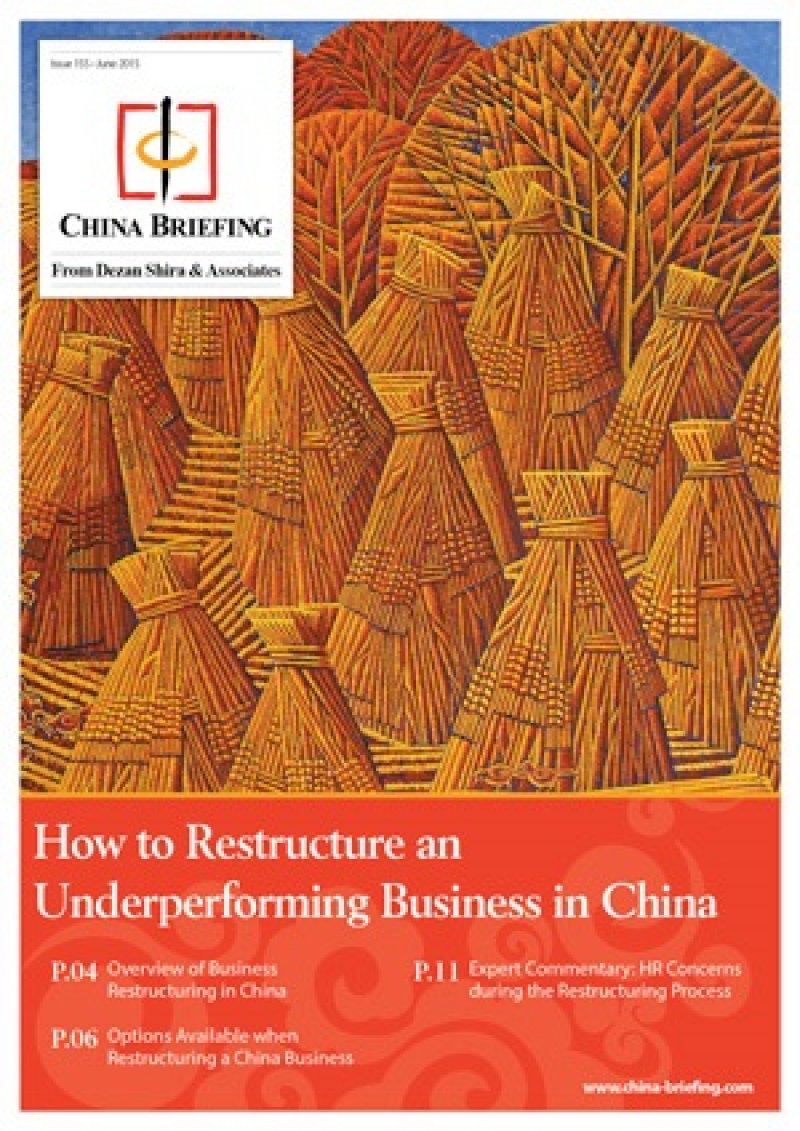Logging into China’s E-Commerce Market: Nationwide Access Announced for Foreign Investors
 By Elizabeth Leclaire
By Elizabeth Leclaire
Foreign investment in China’s lucrative e-commerce market has again been expanded by China’s Ministry of Industry and Information Technology (MIIT). Complete foreign ownership of e-commerce enterprises, previously accessible only to companies within the Free Trade Zones, is now permitted across the whole of China.
As of Friday, June 19th, 2015, WFOEs involved in online data and transaction processing may own up to 100 percent of company shares. MIIT’s new policy broadly expands foreign investor power, as the previous shareholder cap for foreign investors in e-commerce was limited to 50 percent.
The MIIT defines e-commerce services as those which use data and transaction processing forums to create communication networks by which to provide customer service. This includes electronic data for interchange services, network or electronic equipment data processing services, and transaction processing services.
Foreign Investment Opportunities
With the recent MIIT policy changes, China’s e-commerce market presents itself as an immensely profitable sector for foreign investment. By 2013, Chinese online retail sales outgrew that of the United States by a total of 13 percent. In 2014, the Chinese market totaled US$ 390 billion, with China’s most profitable e-commerce company, Alibaba, showing more revenue than Amazon and eBay combined. China’s e-commerce industry has grown annually by 50 percent over the past five years and is expected to generate US$ 520 billion by the end of 2015 alone.
![]() RELATED: E-Commerce in the Shanghai FTZ: Kuajingtong versus Taobao
RELATED: E-Commerce in the Shanghai FTZ: Kuajingtong versus Taobao
China’s e-commerce market is predicted to maintain its strong growth, reaching a total of US$ one trillion by 2018. If this were to occur, the industry will surpass those of the United States, United Kingdom, Germany, France and Japan combined.
Why China is the Ideal E-Commerce Market
Although the global e-commerce industry has continued to expand over the past decade, the growth of the Chinese market has erupted more notably than other nations. China’s consumer base is particularly inclined to engage in e-commerce transactions due to a variety of factors.
- Exponential Increase in Internet Users: Internet was first made public in China in 1994, with approximately 2,000 computers capable of receiving internet access. However, China’s immense population has been quick to adopt the internet into mainstream life. In 2008, 298 million people in China were using the internet, roughly 23 percent of the population. That same year, 74 percent of Americans were using the internet. With a total population of 304 million, that amounts to 224 million. The end of 2014 saw 649 million internet users in China, still only accounting for approximately half of the country’s entire population. As the rest of China comes online, millions of Chinese will make their first e-commerce purchases.
- Increasing Popularity of Online Shopping: Similar to the previous decade’s rapid increase in internet popularity, the recent years have witnessed a wave on online shopping within China. In 2014, 55.7 percent of all internet users engaged in online shopping, a 6.8 percent increase from the previous year. By 2020, 750 million Chinese are predicted to use the internet to satisfy their consumer needs.
- Dependent Rural Consumer Base: Although internet usage declines to 19 percent of Chinese population when entering rural areas, online shopping is actually more common within China’s less developed regions than in its large cities. This results from a lack of alternative shopping methods within China’s rural areas, where shopping malls and brand name stores are few and far between.
- High Population Density: Unlike European or American populations, which are typically dispersed between small cities and suburbs, China’s population is condensed within several massive cities. This form of population distribution makes e-commerce product delivery convenient and inexpensive, for businesses and consumers alike.
Streamlining E-Commerce Efficiency
In addition to providing greater opportunities for foreign investors, China’s State Council announced on June 20th, 2015 that it would encourage and promote an increase in e-commerce efficiency.
The government plans to streamline import and export customs procedures and allow for collective declaration, examination, and release of products. Additionally, China hopes to maintain low taxes on exports while at the same time determining the ideal import tax rate to encourage domestic consumption and competition. China’s State Council has also declared that China will support the engagement of domestic banks in international electronic payment businesses and pilot overseas payment in foreign currencies.
Conclusion
Few markets may be as profitable for foreign investors as China’s e-commerce sector. With a blossoming middle class and increased internet access across the nation, China will continue to be at the forefront of e-commerce developments globally. This lucrative and growing market has only just been made entirely accessible to foreign investors, and coming years will be rewarding for those who capitalize upon the opportunities it has to offer.
|
Asia Briefing Ltd. is a subsidiary of Dezan Shira & Associates. Dezan Shira is a specialist foreign direct investment practice, providing corporate establishment, business advisory, tax advisory and compliance, accounting, payroll, due diligence and financial review services to multinationals investing in China, Hong Kong, India, Vietnam, Singapore and the rest of ASEAN. For further information, please email china@dezshira.com or visit www.dezshira.com. Stay up to date with the latest business and investment trends in Asia by subscribing to our complimentary update service featuring news, commentary and regulatory insight. |
![]()
 E-Commerce in China
E-Commerce in China
In this issue of China Briefing Magazine, we cover the current laws pertinent to the e-commerce industry in China, as well as introduce the steps involved in setting up an online shop in the country in order to help provide foreign investors with an overview of the e-commerce landscape in China.
How to Restructure an Underperforming Business in China
In this issue of China Briefing magazine, we explore the options that are available to foreign firms looking to restructure or close their operations in China. We begin with an overview of what restructuring an unprofitable business in China might entail, and then take an in-depth look at the way in which a foreign company can go about the restructuring process. Finally, we highlight some of the key HR concerns associated with restructuring a China business.
China Investment Roadmap: The Entertainment Industry
In this special edition China Briefing Industry Report, we cast our gaze over the broad landscape of China’s entertainment industry, identifying where the greatest opportunities are to be found and why. Next, we detail some of the most important issues for foreign investors to be aware of, including legal, regulatory, and tax considerations specific to the industry. Lastly, we provide an insider analysis of the sector’s unique HR & payroll challenges.
- Previous Article The Publishing Industry in China: Regulatory Nightmare or Niche Market Opportunity?
- Next Article An Introduction to Doing Business in China 2015 – New Report from Dezan Shira & Associates











